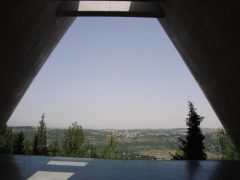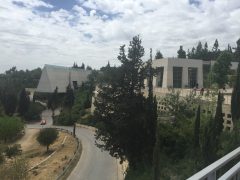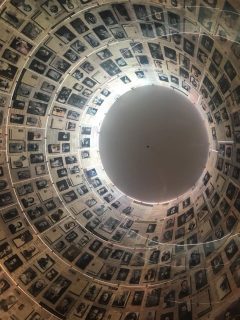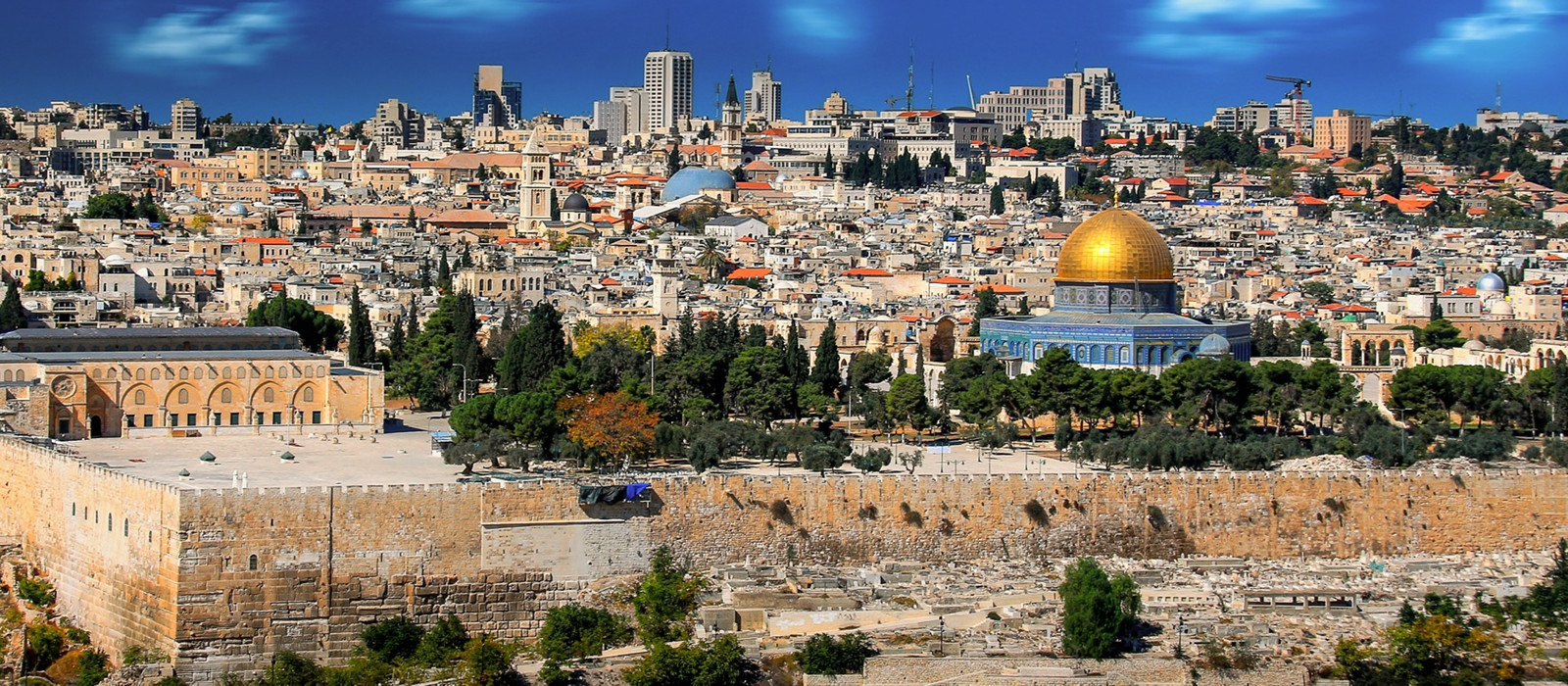 Since we have arrived in Israel, one of the most frequently occurring topics of discussion has been the relevance and importance of the Holocaust in building and shaping Israeli society. As examined by Michael Brenner in the conclusion of his essay “From Zionism to Zion,” the Holocaust was the final major push to the Zionist movement that directly contributed to the founding of the State of Israel. Although he does not understate the importance of the Holocaust in its contribution to Israel’s foundation, he also briefly acknowledges the fact that there were other factors that contributed to the country’s foundation.
Since we have arrived in Israel, one of the most frequently occurring topics of discussion has been the relevance and importance of the Holocaust in building and shaping Israeli society. As examined by Michael Brenner in the conclusion of his essay “From Zionism to Zion,” the Holocaust was the final major push to the Zionist movement that directly contributed to the founding of the State of Israel. Although he does not understate the importance of the Holocaust in its contribution to Israel’s foundation, he also briefly acknowledges the fact that there were other factors that contributed to the country’s foundation.
 The brief mention of the relationship between the Holocaust, the Zionist movement, and the foundation of the State of Israel in Brenner’s essay was expanded upon by Professor Litvak in his lecture to us at Tel Aviv University. Dr. Litvak presented a narrative that argued that the State of Israel was not a product of the Holocaust alone. In the time before the Holocaust, there were many events that led to the creation of an independent Jewish state, especially given the fact that the Zionist movement predated the Holocaust. However, he did explain that the Holocaust was a major contributing fact to the creation of the state, as it was the push that the international community needed in order to force it to do something to assist the Jewish people and prevent further genocide against them.
The brief mention of the relationship between the Holocaust, the Zionist movement, and the foundation of the State of Israel in Brenner’s essay was expanded upon by Professor Litvak in his lecture to us at Tel Aviv University. Dr. Litvak presented a narrative that argued that the State of Israel was not a product of the Holocaust alone. In the time before the Holocaust, there were many events that led to the creation of an independent Jewish state, especially given the fact that the Zionist movement predated the Holocaust. However, he did explain that the Holocaust was a major contributing fact to the creation of the state, as it was the push that the international community needed in order to force it to do something to assist the Jewish people and prevent further genocide against them.
In contrast to this narrative about the relationship between the Holocaust and the foundation of Israel is the narrative that was presented by Yad Vashem. Here, the museum presented a very simple narrative. The museum began by describing the distribution of the Jewish people across Europe and the Mediterranean, followed by an introduction of
anti-Semitism, the rise of the Nazi Party and Adolf Hitler in Germany, and finally an examination of the development of the Final Solution and the progression of the Holocaust. At the end of the museum, it is made quite clear that the solution to preventing further persecution and genocide against the Jewish people is the creation of an independent Jewish state in the Land of Israel. This point is pushed one last time as you exit the final exhibit and enter onto a bright balcony overlooking the city of Jerusalem after hours of being trapped in the dark museum. In contrast to Dr. Litvak’s narrative, Yad Vashem’s narrative presented the idea that the Holocaust was the event that triggered the formation of the State of Israel.
 Although we have had the opportunity to hear different narratives about the relationship between the Holocaust and foundation of the State of Israel, our many discussions about the topic have made it clear that the Holocaust has been important in shaping Israeli identity regardless of how it is presented. In particular, Dalia Ofer’s article “The Past That Does Not Pass: Israelis and Holocaust Memory” has also contributed to this discussion and has demonstrated how the event continues to impact Israeli life 70 years later. As Ofer describes, for many Jewish-Israelis, the Holocaust is still a vibrant force in their lives and imaginations. Its impact has been multifaceted, as the meaning of the Holocaust and the lessons that it presents
Although we have had the opportunity to hear different narratives about the relationship between the Holocaust and foundation of the State of Israel, our many discussions about the topic have made it clear that the Holocaust has been important in shaping Israeli identity regardless of how it is presented. In particular, Dalia Ofer’s article “The Past That Does Not Pass: Israelis and Holocaust Memory” has also contributed to this discussion and has demonstrated how the event continues to impact Israeli life 70 years later. As Ofer describes, for many Jewish-Israelis, the Holocaust is still a vibrant force in their lives and imaginations. Its impact has been multifaceted, as the meaning of the Holocaust and the lessons that it presents
vary depending on the individual and their context, but Holocaust memory can also be manipulated by agents in order to achieve specific goals. Given this variety, the ways in which the Holocaust resurfaces in Israeli society varies, and includes political and social contexts.
One of the ways that we have seen this resurfacing has been in the relationship between Israel and other countries, which was discussed by Dr. Kranz in her discussion with us at Yad Vashem. As Dr. Kranz described, one of the most peculiar examples of this is the relationship that has developed between Israel and Germany. On one hand, some Israelis continue to distrust and dislike Germans because of their role in the Holocaust. On the other hand, a close relationship between the two countries has developed over time as Germany has attempted to assist in the building of an independent Jewish state. However, as many of our other readings and lectures have pointed out, the Holocaust has also shaped relationships between Israel and many other countries as well.
With the Holocaust being a pivotal event in the history of the Jewish people and humanity as a whole, the chances of the Holocaust continuing to resurface and impact Israeli and global society are likely to be high. Holocaust denial, the Israeli-Palestinian conflict, and modern anti-Semitism in both the West and among some Muslim populations are just some of the platforms upon which the Holocaust continues to resurface across the world and shape the relationships between Israel and others.
By: Sam Henderson
